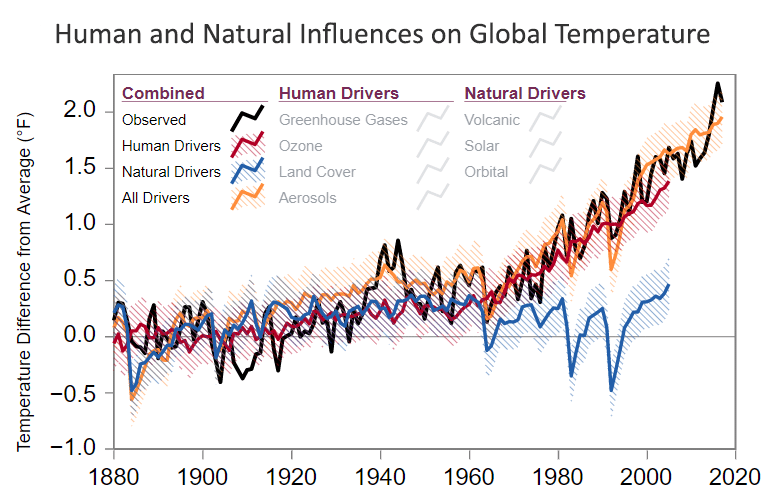I’ll be perfectly honest with you, I never believed in climate change. Well, that’s not entirely accurate. I knew that the natural cycles of the earth’s climate ultimately would see the world heat up and cool down, but anthropogenic climate change was something that I simply refused to believe. Anthropogenic climate change is the impact humans have on the environment that causes changes in the earth’s climate.
Disbelief in climate change is widespread among Australians. Varying degrees of understanding, as well as apathy to the concept, is a common thing I encounter in my work with Energy Matters, as well as in general social interactions. And I can see why.
I couldn’t see how human activity could possibly have any impact on the rise and fall of the oceans or the weather. I would laugh off the notion and argue until my face was blue that it didn’t exist. A new job opportunity changed all of that.
Climate change through the eyes of a sceptic
Some would say it’s a right of passage for young Aussies, but working in a call centre was never on my to-do list. The ending of one job saw me frantically searching for anything that would help pay the bills. Desperation resulted in answering phone calls for the former Department of Climate Change and Energy Efficiency. I thought it ironic at the time: a climate change sceptic discussing all things climate change related with the general public. I dismissed everything I was advocating for publicly based on my distrust of government science. That was when I decided to do my own ‘research’.
Doing your own research is a misnomer. Unless you are actively studying, testing, trialling, and documenting a subject, you are not, in fact, researching. What I did do was deep dive into as many articles, studies, journals, and statistics as I could get my hands on. In my efforts to avoid ‘government science’ I found that the government is actually quite good at sourcing their information from non-government bodies.
Slowly, but surely, I found that my arguments against were starting to wear thin. I began to support my once-forced position on climate change with the information I had sourced myself. This ultimately resulted in the position of manager of the contact centre and then eventually a position at Energy Matters.
Difference between natural and anthropogenic climate change
I’ve heard all the arguments against it, and I was once one of the loudest voices. Here are just a few, and some data points to counter:
Climate records (usable for averages) only go back to 1880, so how can we know the impact humans have had on the climate?
Instrument data collection for temperature began in 1880, but we do have other data points that we can look to. Beyond the thermometer readings that began in 1659 in the UK, we have observable climate proxy records in the form of tree rings, ice cores, and similar dating and temperature impact studies.
The industrial revolution began in 1760, but the greatest rapid temperature increases can be seen from the 1970s to the present day. 2022 saw the mean global temperature of 14.8°C – which is the hottest it has been in tens of thousands of years. Here is a brief timeline of documented global mean temperatures and levels of carbon dioxide gas (CO2) in the atmosphere (in parts per million – ppm):
- 1850-1890: 13.6°C, 290ppm
- 1960: 13.9°C, 315ppm
- 2022: 14.8°C, 421ppm
The earth experienced a ‘Little ice age’ between 1400 and 1800 that saw the mean global temperature decline steadily from around 900AD by approximately 1°C. The industrial revolution kickstarted an upward trend that saw the earth heat by approx. 1.5°C in just 200 years.
All data, both instrumental and climate proxy, points to a rapid change in our climate that was unprecedented.
The earth has heated and cooled naturally for millennia with no major human interference
This is absolutely correct, though the rate at which climate change occurred was measured in thousands of years, not hundreds. Ice core records from Antarctica show the shift in temperatures and CO2 over the last 800 thousand years.

Source: www.carbonbrief.org
The earth hasn’t been this hot in tens of thousands of years, from all records.
You can see in the graphs that there have been natural cycles every 150 thousand years, give or take. What makes the current change in climate unique, however, is the sharp increase since the industrial revolution. The current levels of CO2 are the highest recorded in 800,000 years.
Human impact on the climate is unprecedented. The rate at which our global temperature is increasing is not natural, nor does it follow any previous major climate shifts. Since 1981, the temperature has been increasing by 0.18°C every decade. That’s twice as fast as the timeframe leading up to 1981 from 1880 (0.08°C per decade).
The emissions from a single volcanic event outweigh human emissions
This is a common statement, and wildly inaccurate. There’s no arguing about the extreme emissions expelled by volcanic eruptions. But the total combined annual emissions from humans are 60 times more than the total combined annual emissions from volcanoes. In fact, volcanic eruptions are directly linked to the shift in the earth’s climate. So as the world heats up, and our climate shifts, you can expect to see more volcanic eruptions – thus adding to climate change.

Source: https://www.epa.gov/climatechange-science/causes-climate-change
There’s nothing Australians can do to make an impact, even if it is all true
You’ve no doubt heard of the butterfly effect; a small, seemingly insignificant act can have a drastic effect on the world. This is true of climate change, and it is also true of Australia’s response. There’s no doubting the figures, Australia is ranked 16th with 1.1% of the world’s CO2 emissions (2021). This figure makes our emissions seem insignificant, especially when compared to the world’s 1st (China, 30.9%) and 2nd (USA, 13.5%) highest polluters.
But Australia is positioned to not only move towards net zero (becoming carbon neutral) but impacting the rest of the world for the better. Australia is poised to become an energy superpower, with international offerings of green iron and steel, hydrogen, and harnessing one-tenth to one-quarter of the world’s lithium, copper, nickel and manganese reserves.
If climate change is real, what can I do to reduce its impact?
The inevitable question that follows the awakening to climate change is ‘What can I possibly do to stop it?’. It’s an existential crisis that so many people across the world are facing – and I am here to ease your fears.
Climate policy is mostly out of our control. While we can use our voice to vote in and out policymakers, and petition for change, the ultimate change comes down to our personal choices. As previously stated, the butterfly effect can be enacted with every action we take. Here are some personal choices I made with my family to strive for a greener future:
Buying power
Buying sustainable products not only makes a difference to the environment but can save you hundreds – thousands of dollars each year.
- Swapping out brands: look for brands that invest in sustainable practices and manufacturing.
- Reduce waste: Buy only what you need, buy seasonal vegetables and fruits, look for items with reduced packaging, donate and reuse. If you use feminine hygiene products, move away from disposables and opt for reusables.
Renewable energy technology
Energy Matters is all about investing in renewable tech. Purchase and invest in products that are better for the environment as well as reduce your ongoing costs.
- Solar: We installed solar around 4 years ago and the system has already been paid off and then some. We maximise our system by washing our clothes during the day, running the dishwasher at first light, and restricting major electrical use to daytime hours
- LED lights: We not only swapped out all of our lights for LEDs but we opted for smart lights. This means that we can switch on/off the lights from anywhere in or out of the house! Very much living out my Alex Mack dreams (for all you 90s kids!)
- Heat pump: This was a recent investment and we have already seen a drastic reduction in the operational costs of our hot water system. If you live in Victoria, I highly recommend looking into a heat pump upgrade with the new rebates available.
Leave the car at home
This one is nothing new, but it is often overlooked. If you live local to the amenities you need, opt to walk occasionally. My kids’ school is 20 minutes away by car, so this is not a challenge I’m willing to undertake as yet. But if your school is within walking distance, make the swap a couple of days a week. My local shops are a major shopping centre so I’m spoiled with my options for walking rather than driving!
We have future plans to purchase an electric vehicle (my husband’s dream) and install battery storage. We have made the changes according to our family’s needs and our budget.
Change can be uncomfortable. Just look at the switch from plastic to paper straws! But humans are incredible at adapting. Can you remember when almost all take-out foods were in polystyrene containers? I can still remember the day they brought in the large, white recycling bags (early 90s in Adelaide) so that we could begin to sort our household waste. Prior to that, all waste went straight into the bin. The move to reusable shopping bags has been one that I’ve found challenging (I always leave them at home) but I have slowly adapted to ditching the bags altogether and popping all the shopping straight into my boot. Difficult or inconvenient tasks of today form simple routines for the future.
Still not convinced?
Ultimately, whether you believe in anthropogenic climate change or not should make no difference. The aforementioned changes I made to how we purchase and use items and interact with the world all make economic sense. We have saved thousands just by making some small investments and simple changes.
The way I see it is that, regardless of the overarching reason, making changes to improve the world, whilst saving money, is a positive thing. While the evidence is there for climate change, the greatest change we should be looking at is how we interact with the world.
I do miss plastic straws, though!














































